5 books about Lumbermen
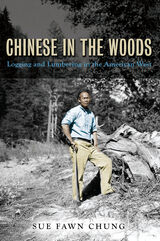
Chinese in the Woods
Logging and Lumbering in the American West
Sue Fawn Chung
University of Illinois Press, 2015
Though recognized for their work in the mining and railroad industries, the Chinese also played a critical role in the nineteenth-century lumber trade. Sue Fawn Chung continues her acclaimed examination of the impact of Chinese immigrants on the American West by bringing to life the tensions, towns, and lumber camps of the Sierra Nevada during a boom period of economic expansion. Chinese workers labored as woodcutters and flume-herders, lumberjacks and loggers. Exploding the myth of the Chinese as a docile and cheap labor army, Chung shows Chinese laborers earned wages similar to those of non-Asians. Men working as camp cooks, among other jobs, could make even more. At the same time, she draws on archives and archaeology to reconstruct everyday existence, offering evocative portraits of camp living, small town life, personal and work relationships, and the production and technical aspects of a dangerous trade. Chung also explores how Chinese used the legal system to win property and wage rights and how economic and technological change ultimately diminished Chinese participation in the lumber industry. Eye-opening and meticulous, Chinese in the Woods rewrites an important chapter in the history of labor and the American West.
[more]
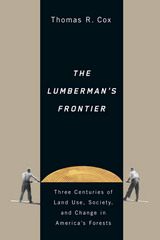
The Lumberman's Frontier
Three Centuries of Land Use, Society, and Change in America's Forests
Thomas R. Cox
Oregon State University Press, 2010
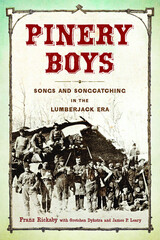
Pinery Boys
Songs and Songcatching in the Lumberjack Era
Edited by Franz Rickaby with Gretchen Dykstra and James P. Leary
University of Wisconsin Press, 2017
As the heyday of the lumber camps faded, a young scholar named Franz Rickaby set out to find songs from shanty boys, river drivers, and sawmill hands in the Upper Midwest. Traveling mostly on foot with a fiddle slung over his shoulder, Rickaby fell into easy conversation with the men, collecting not just the words of songs, but the tunes, making careful notes about his informants and their performances. Shortly before his groundbreaking and much-praised Ballads and Songs of the Shanty Boy was published in 1926, Rickaby died, leaving later folklorists, cultural historians, and folksong enthusiasts with little knowledge of his life and other unpublished research.
Pinery Boys now incorporates, commemorates, contextualizes, and complements Rickaby's early work. It includes an introduction and annotations throughout by eminent folklore scholar James P. Leary and an engaging, impressively researched biography by Rickaby's granddaughter Gretchen Dykstra. Central to this edition are Rickaby's own introduction and the original fifty-one songs that he published—including "Jack Haggerty's Flat River Girl," "The Little Brown Bulls," "Ole from Norway," "The Red Iron Ore," and "Morrissey and the Russian Sailor"—plus fourteen additional songs selected to represent the varied collecting Rickaby did beyond the lumber camps.
Supplemented by historical photographs, Pinery Boys fully reveals Franz Rickaby as a visionary artist and scholar and provides glimpses into the past lives of woods poets and singers.
Pinery Boys now incorporates, commemorates, contextualizes, and complements Rickaby's early work. It includes an introduction and annotations throughout by eminent folklore scholar James P. Leary and an engaging, impressively researched biography by Rickaby's granddaughter Gretchen Dykstra. Central to this edition are Rickaby's own introduction and the original fifty-one songs that he published—including "Jack Haggerty's Flat River Girl," "The Little Brown Bulls," "Ole from Norway," "The Red Iron Ore," and "Morrissey and the Russian Sailor"—plus fourteen additional songs selected to represent the varied collecting Rickaby did beyond the lumber camps.
Supplemented by historical photographs, Pinery Boys fully reveals Franz Rickaby as a visionary artist and scholar and provides glimpses into the past lives of woods poets and singers.
[more]
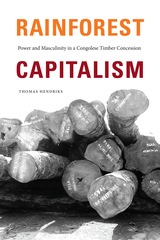
Rainforest Capitalism
Power and Masculinity in a Congolese Timber Concession
Thomas Hendriks
Duke University Press, 2022
Congolese logging camps are places where mud, rain, fuel smugglers, and village roadblocks slow down multinational timber firms; where workers wage wars against trees while evading company surveillance deep in the forest; where labor compounds trigger disturbing colonial memories; and where blunt racism, logger machismo, and homoerotic desires reproduce violence. In Rainforest Capitalism Thomas Hendriks examines the rowdy world of industrial timber production in the Democratic Republic of the Congo to theorize racialized and gendered power dynamics in capitalist extraction. Drawing on ethnographic fieldwork among Congolese workers and European company managers as well as traders, farmers, smugglers, and barkeepers, Hendriks shows how logging is deeply tied to feelings of existential vulnerability in the face of larger forces, structures, and histories. These feelings, Hendriks contends, reveal a precarious side of power in an environment where companies, workers, and local residents frequently find themselves out of control. An ethnography of complicity, ecstasis, and paranoia, Rainforest Capitalism queers assumptions of corporate strength and opens up new ways to understand the complexities and contradictions of capitalist extraction.
[more]
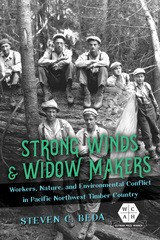
Strong Winds and Widow Makers
Workers, Nature, and Environmental Conflict in Pacific Northwest Timber Country
Steven C. Beda
University of Illinois Press, 2023
Winner of the 2022 Philip Taft Labor History Book Prize
Often cast as villains in the Northwest's environmental battles, timber workers in fact have a connection to the forest that goes far beyond jobs and economic issues. Steven C. Beda explores the complex true story of how and why timber-working communities have concerned themselves with the health and future of the woods surrounding them. Life experiences like hunting, fishing, foraging, and hiking imbued timber country with meanings and values that nurtured a deep sense of place in workers, their families, and their communities. This sense of place in turn shaped ideas about protection that sometimes clashed with the views of environmentalists--or the desires of employers. Beda's sympathetic, in-depth look at the human beings whose lives are embedded in the woods helps us understand that timber communities fought not just to protect their livelihood, but because they saw the forest as a vital part of themselves.
Often cast as villains in the Northwest's environmental battles, timber workers in fact have a connection to the forest that goes far beyond jobs and economic issues. Steven C. Beda explores the complex true story of how and why timber-working communities have concerned themselves with the health and future of the woods surrounding them. Life experiences like hunting, fishing, foraging, and hiking imbued timber country with meanings and values that nurtured a deep sense of place in workers, their families, and their communities. This sense of place in turn shaped ideas about protection that sometimes clashed with the views of environmentalists--or the desires of employers. Beda's sympathetic, in-depth look at the human beings whose lives are embedded in the woods helps us understand that timber communities fought not just to protect their livelihood, but because they saw the forest as a vital part of themselves.
[more]
READERS
Browse our collection.
PUBLISHERS
See BiblioVault's publisher services.
STUDENT SERVICES
Files for college accessibility offices.
UChicago Accessibility Resources
home | accessibility | search | about | contact us
BiblioVault ® 2001 - 2024
The University of Chicago Press









